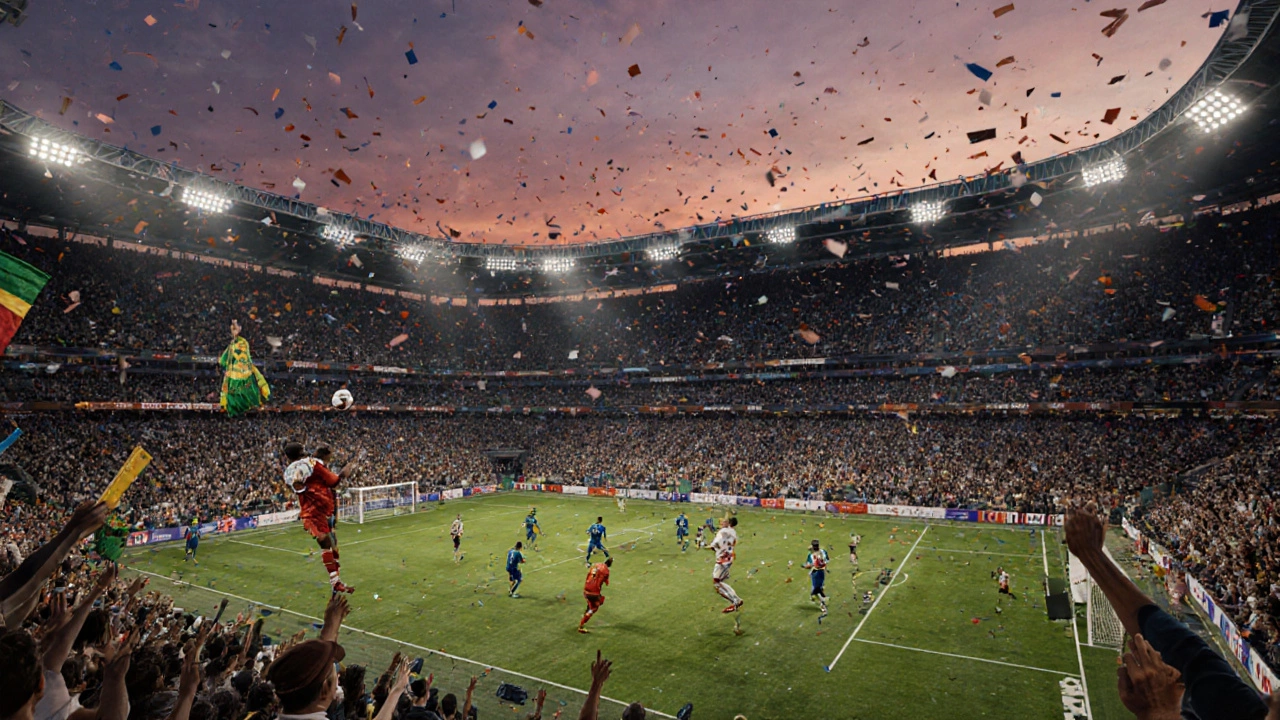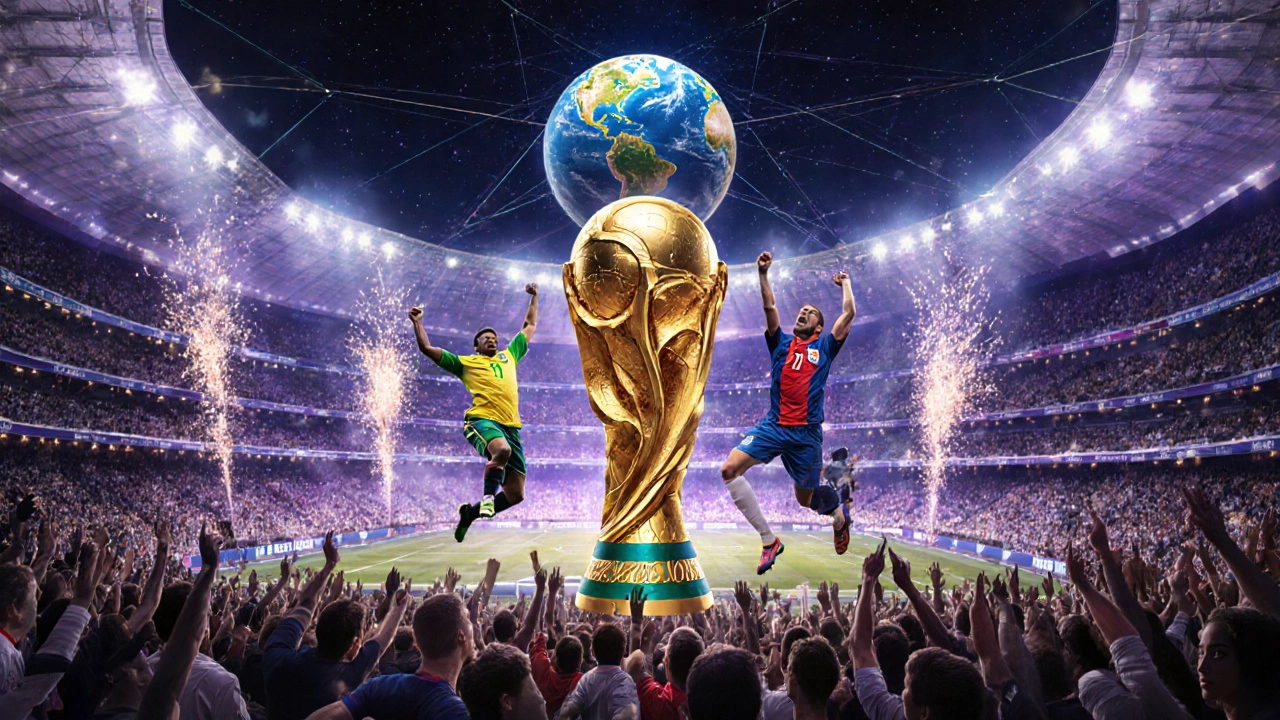What Is FIFA Football (Soccer)? Definition, Rules, and Global Impact

FIFA Football Terminology Explorer
Explore Regional Terminology
Select a region to learn how the sport is commonly referred to worldwide.
Common Term:
Explanation:
Complete Terminology Table
View all regional usage patterns for FIFA football terminology.
| Region | Common Term |
|---|---|
| Europe, Africa, South America | Football |
| United States, Canada, Australia | Soccer |
| United Kingdom (Historical) | Association football |
Did You Know?
The terms "football" and "soccer" refer to the exact same sport. The difference is cultural and linguistic.
- The term "soccer" comes from "association football," which was shortened.
- FIFA (the global governing body) uses "football" because it's the predominant term in most countries.
- In some countries like England, "football" refers to the sport we know as soccer in the US.
Key Takeaways
- FIFA football, also called soccer, is a team sport governed worldwide by the Fédération Internationale de Football Association.
- The sport follows the "Laws of the Game" maintained by the International Football Association Board.
- The FIFA World Cup is the most watched single‑sport event on the planet.
- Technology such as VAR has reshaped officiating in recent years.
- Terminology varies: most of the world calls it football, while the UnitedStates, Canada, and Australia often use soccer.
Understanding the Core Entity
When people ask, "What is FIFA football?", they’re really asking about the sport that unites billions under one set of rules. FIFA is the global governing body that organizes, regulates, and promotes football (known as soccer in some regions). Founded in 1904 in Paris, FIFA now represents 211 national associations and runs the sport’s flagship tournaments.
Football vs. Soccer: Naming Matters
The word football is a term used by the vast majority of countries to describe the game played with a spherical ball on a rectangular pitch dates back to the 19th‑century British public schools. In the UnitedStates, Canada, Australia, and a few other places, the sport became known as soccer is a shortened form of “association football,” adopted to differentiate it from other codes like American football or Australian rules football. The distinction is purely linguistic; the rules, equipment, and governing bodies remain the same.
The Governing Architecture
FIFA sits at the top of a hierarchical network of confederations and national federations. The six continental confederations-UEFA (Europe), CONMEBOL (South America), CONCACAF (North, Central America and Caribbean), CAF (Africa), AFC (Asia), and OFC (Oceania)-each organize regional competitions and feed teams into global events.
UEFA is the European governing body that runs the Champions League, European Championship and other continental tournaments. Likewise, CONMEBOL is the South American federation responsible for the Copa América and Libertadores club competition. Together, these entities ensure that the sport’s standards are applied worldwide.

Rules That Keep the Game Fair
The official rulebook is called the "Laws of the Game". It is maintained by the International Football Association Board is the joint body of FIFA and the four British football associations that decides on rule changes and interpretations. There are 17 laws covering everything from the size of the football pitch is the rectangular playing surface, typically 105m×68m for international matches to the duties of the referee.
Key points include:
- Each team fields 11 players, including a goalkeeper.
- Matches are 90 minutes, split into two 45‑minute halves.
- Goals count only when the entire ball crosses the goal line between the posts.
- Fouls and misconduct may result in free‑kick, penalty‑kick, or caution (yellow card) / dismissal (red card).
Technology on the Field: VAR
In 2018, FIFA introduced the Video Assistant Referee is a system that allows referees to review controversial decisions using video footage and a central review team. VAR can intervene in four situations: goals, penalty decisions, direct red‑card incidents, and cases of mistaken identity. While critics argue it disrupts flow, supporters claim it dramatically reduces clear errors.
The Pinnacle Event: The FIFA World Cup
The World Cup is the quadrennial international tournament that crowns the champion of FIFA football, drawing over 3billion viewers worldwide is the sport’s ultimate showcase. It begins with a 32‑team finals phase (expanding to 48 teams in 2026) after months of regional qualifiers. The tournament not only crowns a champion but also fuels national pride, tourism, and massive economic activity.
Ranking and Global Reach
FIFA maintains the official FIFA ranking is a points‑based system that evaluates national teams based on match results, opponent strength, and competition importance. As of the latest cycle, Brazil, Argentina, and France occupy the top three spots, reflecting consistent performance in World Cup qualifiers and continental tournaments.
Beyond elite competition, football is played in schools, parks, and street corners across every continent. The sport’s low entry cost-a ball and a flat surface-makes it accessible to people of all socioeconomic backgrounds.

Regional Terminology Snapshot
| Region | Common Term |
|---|---|
| Europe, Africa, South America | Football |
| UnitedStates, Canada, Australia | Soccer |
| UnitedKingdom (historical) | Association football |
Common Misconceptions
Many think "soccer" is a different sport. In reality, it is the same game; the name simply reflects local linguistic history. Another myth is that FIFA decides every rule change. In truth, the IFAB-where FIFA holds only four of eleven votes-has the final say on the Laws of the Game.
People also assume the World Cup is the only major tournament, but continental championships like the UEFA European Championship, Copa América, and AFC Asian Cup attract comparable passion and talent.
Quick Checklist for New Fans
- Watch a full match to see the 17 Laws in action.
- Follow your national team’s FIFA ranking to gauge performance.
- Understand the difference between "football" and "soccer" based on where you live.
- Keep an eye on VAR decisions; they can change outcomes in seconds.
- Mark the next World Cup or continental tournament on your calendar.
Frequently Asked Questions
Why does FIFA use the term "football" when many countries say "soccer"?
FIFA is an international organization representing 211 member associations, most of which refer to the sport as football. The term "soccer" is primarily used in countries where other football codes dominate the lexical landscape.
What body actually writes the Laws of the Game?
The International Football Association Board (IFAB) is responsible for drafting and updating the 17 Laws. FIFA participates as one of four voting members, but the British associations hold the majority of votes.
How often is the FIFA World Cup held?
The tournament occurs every four years, with a month‑long finals phase hosted by a different nation each time.
What is VAR and when is it used?
VAR stands for Video Assistant Referee. It is consulted for four specific scenarios: goal/no‑goal decisions, penalty awards, direct red‑card incidents, and cases of mistaken identity.
How does the FIFA ranking work?
The ranking awards points for each match based on result, opponent strength, match importance, and regional weighting. Points are averaged over a four‑year cycle, with recent results carrying more weight.
Is there a difference in the ball used for football and soccer?
No. The sport uses a single official ball design standardized by FIFA. Whether you call the sport football or soccer, the ball specifications are identical.
Can a match end in a draw during the World Cup?
During the group stage, matches can end in a draw, and points are allocated (3‑1‑0). In the knockout phase, ties are resolved through extra time and, if needed, a penalty shoot‑out.
What are the main responsibilities of a football referee?
The referee enforces the Laws, controls the match tempo, makes disciplinary decisions, and signals stoppages. Assistant referees (linesmen) and the VAR team support the referee in making accurate calls.
Whether you grew up calling it football or soccer, understanding the structure behind FIFA football helps you appreciate why the sport commands such a massive global audience.
